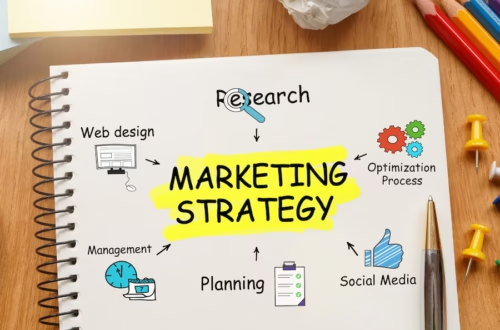In today’s digital-first world, having an online presence is no longer optional—it’s essential. Whether you’re a student launching a side hustle or a small business owner trying to grow on a limited budget, creating an effective digital marketing strategy for small businesses is key to standing out in a crowded market.
This guide will walk you through a low-cost, high-impact strategy that works—even if you’re working with less than $100 per month. Let’s dive into the tactics that deliver real results.
1. Start with a Clear Goal and Audience

Define Your Business Objective
Before running Facebook ads or launching a website, get clear on your goals. Do you want to:
- Drive traffic to your site?
- Generate leads?
- Build brand awareness?
- Increase sales?
Your entire small business marketing plan should be centered around this primary objective.
Understand Your Target Audience
Knowing your ideal customer is half the battle. Use free tools like:
- Google Trends – to understand what people are searching for
- Reddit & Quora – to observe real conversations
- Facebook Groups – to see what questions your niche audience is asking
Creating a basic customer avatar helps you tailor your content and messaging effectively.
2. Build a Strong Online Presence on a Budget

Set Up a Mobile-Optimized Website
You don’t need to hire a web developer to get started. Use beginner-friendly platforms like:
- Wix (drag-and-drop interface)
- WordPress (more customizable)
- Carrd (perfect for one-page sites)
Add basic SEO plugins like RankMath or Yoast SEO to optimize for search engines.
Claim Your Google Business Profile
For service-based businesses or physical locations, setting up your Google Business Profile is crucial for local SEO. It helps your business appear in Maps and local search results—free of charge.
3. Use Social Media Intentionally

Choose the Right Platforms
Trying to be everywhere at once is a fast way to burn out. Focus on the platforms where your audience already spends time:
- Instagram & TikTok – great for visual brands and eCommerce
- Facebook – useful for local businesses and community engagement
- LinkedIn – best for B2B or service providers
Focus on Consistency
You don’t need to go viral to win. Posting consistently 3–4 times per week builds trust and brand familiarity. Use free tools like:
- Canva – for designing professional visuals
- ChatGPT – to generate caption ideas and content hooks
- Meta Business Suite – to schedule posts
4. Leverage Content Marketing for Long-Term Growth

Start a Simple Blog or Newsletter
Content marketing is one of the most cost-effective digital marketing strategies for small businesses. Blogging once a week on topics your customers care about can boost your organic search visibility over time.
Free tools to guide your content:
- AnswerThePublic – for keyword questions
- Ubersuggest – for low-competition SEO keywords
Use AI Tools to Speed Up Writing
Don’t spend hours writing. Use AI tools like:
- ChatGPT – for outlines and drafts
- Jasper AI – for more advanced copywriting
- Notion AI – for blog structuring and editing
5. Try Paid Ads with Micro Budgets

Use Retargeting Ads on Meta Platforms
Even a $1/day ad spend can work if it’s focused. Use Meta Ads Manager to retarget:
- People who visited your website
- Instagram users who saved or liked your content
- Email subscribers with custom audiences
Promote High-Converting Offers
Don’t waste your budget on generic posts. Promote:
- Lead magnets (e.g., free guides or discounts)
- Service bundles or seasonal sales
- High-value testimonials or case studies
Read More : How to create a digital marketing strategy from scratch
6. Track, Measure & Improve

Use Free Analytics Tools
Without tracking, you’re just guessing. Use:
- Google Analytics – to monitor site traffic
- Meta Insights – to review ad performance
- Google Search Console – for SEO performance and errors
Learn and Iterate
Small budgets mean every dollar counts. Use a simple Google Sheet or Notion board to track:
- Which content types perform best
- What platforms bring the most engagement
- How users move from post to purchase
Keep It Simple and Sustainable
You don’t need a massive budget to market your business effectively. By combining clarity, consistency, and smart tools, your digital marketing strategy for small businesses can be both affordable and impactful.
Start small, stay consistent, and focus on what’s working. Over time, your $100 marketing strategy can generate serious returns.


